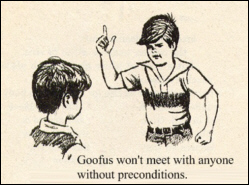Independent Newspapers, Inc. v. Brodie, — A.2d —, 2009 WL 484956 (Md. February 27, 2009)
Maryland’s highest state court has issued a comprehensive opinion setting out the proper framework trial courts should use when evaluating whether a plaintiff should be permitted to learn the identity of an anonymous (or pseudonymous) internet speaker. After considering the varying standards courts across the country have applied in balancing the First Amendment right to anonymity against the right of a plaintiff to seek redress, the court adopted, in large part, the standard put forth in the New Jersey case of Dendrite, Int’l. v. Doe, 775 A.2d 756 (N.J. Super. Ct. App. Div. 2001) which requires, among other things, a prima facie showing by the plaintiff before compulsory discovery concerning the identity of an unknown defendant will be had.

One of the great things about the internet is that users can easily speak anonymously or through a pseudonym. This right to remain unidentified is a free speech right guaranteed by the First Amendment. But that right has limits which start to show when an anonymous speaker goes too far by venturing from the realm of protected speech into that of unprotected defamation.
An aggrieved party going after an unknown defamer must first figure out who the defendant is. This usually involves a subpoena to the operator of the service through which the offending content was transmitted, to the unknown John Doe’s internet service provider, or both. This use of compulsory judicial process to reveal the identity of an unknown speaker pits the speaker’s First Amendment right to anonymity against the defamation plaintiff’s right to seek redress for the tort that has been committed.
It is up to the courts to weigh the competing interests so that:
- a defendant’s First Amendment right to anonymity is not violated by wrongful compelled disclosure in connection with an unmeritorious case; while
- aggrieved subjects of harmful defamatory speech are not deprived of the remedies due to them in a civil society.
This weighing of competing interests illustrates why the scale is a good metaphor for justice.
The Brodie case
Plaintiff Brodie learned that certain participants in an online forum board were saying negative things about him. Three users identified as “CorsicaRiver,” “Born & Raised Here” and “chatdusoleil” engaged in an online public conversation about Brodie’s sale of an historic farmhouse. Two other users, who went by the monikers “RockyRaccoonMD” and “Suze” criticized the way Brodie ran the local Dunkin Donuts shop.
Brodie sued Independent Newspapers (the operator of the forum) and John Does CorsicaRiver, Born & Raised Here and chatdusoleil for defamation. Absent from the list of defendants were RockyRaccoonMD and Suze.
Independent Newspapers moved to dismiss, arguing, among other things, that it was immune from suit under 47 U.S.C. §230. It also moved to quash the subpoena Brodie had served, which sought the identities of CorsicaRiver, Born & Raised Here and chatdusoleil. The court dismissed Independent Newspapers from the case, but ordered it to identify those three pseudonymous posters.
Immediately thereafter, Independent Newspapers asked the court to reconsider its order directing that the pseudonymous speakers be identified. The court granted that motion and dismissed the portion of the case dealing with the discussion of the historic farmhouse. The claims relating to the Dunkin Donuts stayed in, and the court required Independent Newspapers to disclose information concerning that.
Notwithstanding the fact that the farmhouse defamation claims had been tossed, Brodie sent a subpoena to Independent Newspapers seeking the identity of CorsicaRiver, Born & Raised Here, chatdusoleil, RockyRaccoonMD and Suze. Brodie also conceded that the only posters responsible for discussions about the Dunkin Donuts were RockyRaccoonMD and Suze. Independent Newspapers filed another motion to quash this subpoena which the court denied.
The Maryland Court of Appeals granted certiorari to hear the case. (Here’s some trivia for you: in Maryland, the Court of Appeals is the highest court. For some reason they don’t call it the Supreme Court.) On review, the court reversed the denial of the motion to quash. It held that Brodie did not have a sufficient claim of defamation against any of the pseudonymous speakers to justify revealing their actual identities.
Which standard applied
The court gave thorough and comprehensive analysis on the question of when it is appropriate for a trial court to order that an unknown defendant be unmasked. It recognized the important interests that must be balanced, and observed that courts have applied various standards regarding what a plaintiff must show before discovery of an unknown speaker will be permitted.
For example, the Delaware Supreme Court in Doe v. Cahill put forth a rigorous requirement that in addition to providing notice of the discovery being sought, a plaintiff must come forward — at the pleading stage — with facts sufficient to survive a motion for summary judgment. Other courts, such as the U.S. District Court for the Northern District of California, have set the threshold lower. In Columbia Insurance Co. v. Seescandy.com, 185 F.R.D. 573 (N.D. Cal. 1999), the plaintiff was only required to plead facts sufficient to survive a motion to dismiss.
The New Jersey appellate court in Dendrite, Int’l. v. Doe took a more moderate approach. That court held that a plaintiff seeking the identification of an anonymous internet speaker must establish facts sufficient to maintain a prima facie case.
The Maryland court in the present case joined in the more moderate Dendrite approach, holding that when a trial court is confronted with a defamation action in which anonymous speakers or pseudonyms are involved, it should:
- require the plaintiff to undertake efforts to notify the anonymous posters that they are the subject of a subpoena or application for an order of disclosure, including posting a message of notification of the identity discovery request on the message board;
- withhold action to afford the anonymous posters a reasonable opportunity to file and serve opposition to the application;
- require the plaintiff to identify and set forth the exact statements purportedly made by each anonymous poster, alleged to constitute actionable speech;
- determine whether the complaint has set forth a prima facie defamation per se or per quod action against the anonymous posters; and
- if all else is satisfied, balance the anonymous poster’s First Amendment right of free speech against the strength of the prima facie case of defamation presented by the plaintiff and the necessity for disclosure of the anonymous defendant’s identity, prior to ordering disclosure.
The Independent Newspapers case is an important case not necessarily because of any groundbreaking jurisprudence that it establishes, but because of the comprehensive way it treats the issue of unmasking unknown internet speakers. The opinion is a nearly exhaustive look at the current state of this question of law.
Anonymous photo courtesy Flickr user Neil Carey under this Creative Commons license.



![Reblog this post [with Zemanta]](http://img.zemanta.com/reblog_e.png?x-id=c979d9cb-0765-47b2-a007-3e54cc22e6f7)




